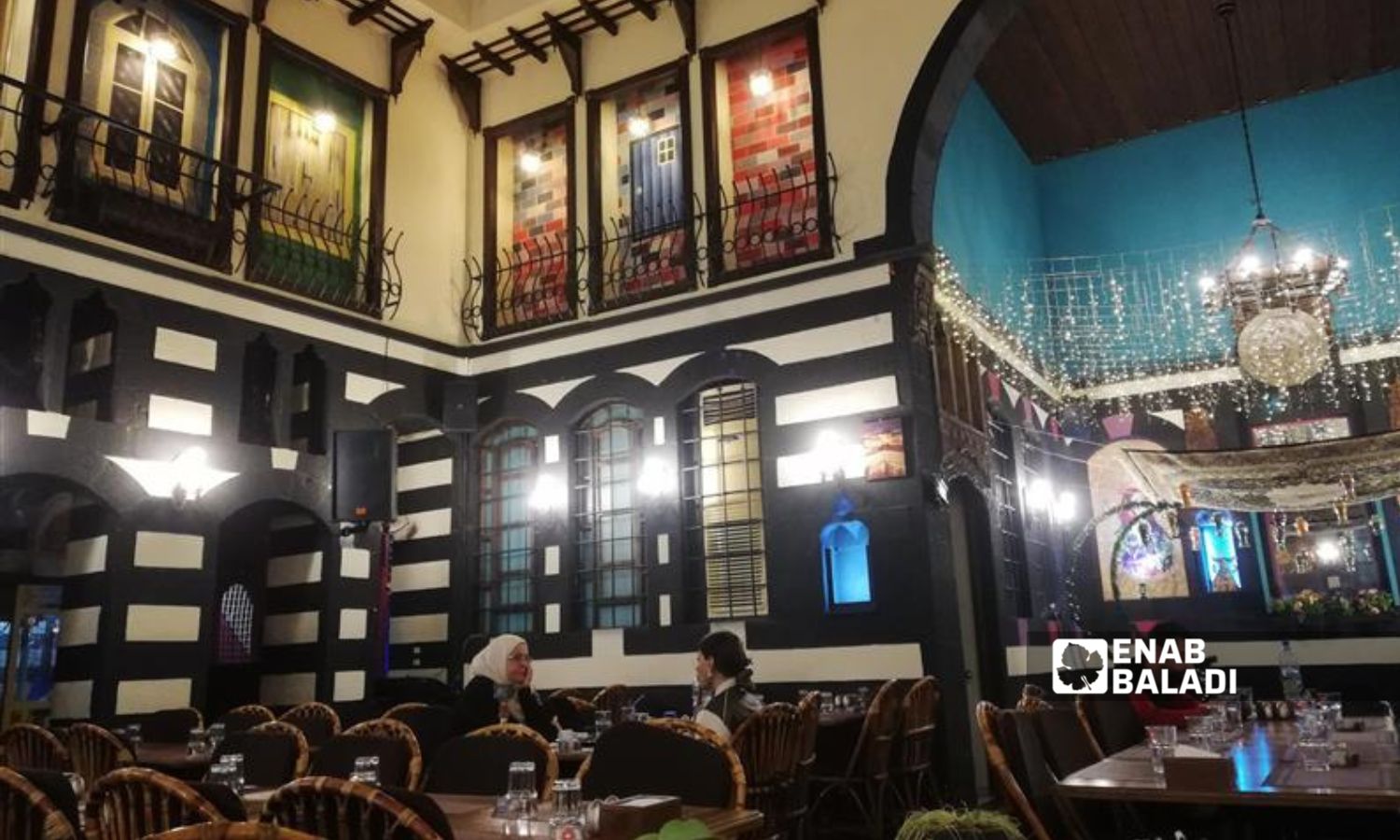



Most restaurants in Damascus are witnessing a decline in visitor numbers during Eid al-Fitr, amid a difficult economic situation many Syrians are facing due to the closure of several companies and a reduction in job opportunities.
Enab Baladi monitored the activity of restaurants in the Mezzeh and Bab Touma areas of Damascus. According to families met by the reporter, visits to restaurants have become limited to ordering some drinks rather than eating meals, as the prices represent a burden that families with limited income cannot bear.
Samar Salman (47 years old), a resident of Mezzeh who was an employee in the public sector and was granted a three-month paid leave, told Enab Baladi that there is a case of severe poverty in most households, as a considerable number of families cannot provide their children with Eid sweets, outings, or new clothes.
In a situation where a restaurant bill for a family of five reaches 300,000 Syrian pounds, families are opting for parks to alleviate financial burdens instead of going to restaurants, as stated by Hussein Mohammed, a resident of Mezzeh 86, whom Enab Baladi met while accompanying his children for a stroll in the French park in Damascus.
Mohammed explained that prices have somewhat decreased, but the purchasing power of most citizens is weak. He stated that this year he could not take his family to a restaurant during Eid, unlike previous years, and that the park served as a decent form of entertainment and a better option than paying 300,000 for a single meal.
Zakiya Mardini (43 years old) from the Bab Touma area, a housewife, noted that her husband used to take her and their children to a restaurant at least once during Eid al-Fitr every year, but this year they decided to buy household necessities that would last them for two days or more instead of visiting a restaurant.
Meanwhile, Ikhlas Faraj (40 years old) from the Tadamon neighborhood told Enab Baladi that today’s Eid in Syria is “different for everyone,” and that this year’s Eid joy is incomplete due to poverty, indicating that she is foregoing luxuries such as going to restaurants, and she and her husband work throughout the month to secure the rent of their house and feed their children. In her opinion, restaurants are a luxury they can do without.
Ziad Murtada, the owner of a restaurant in the Mezzeh area of Damascus, said that Eid al-Fitr did not meet expectations in terms of lunch or dinner reservations, especially regarding corporate bookings, which were completely absent.
He explained that in the past, it was customary for companies to have a budget allocated to treat their employees to lunch or dinner, but this year, that was nearly nonexistent.
He pointed out that most fast-food restaurants have started adopting a policy of “promotions on meal deals,” yet the number of families visiting the restaurant remains low.
He noted that the restaurant owner considers themselves to be at a loss during a time when income is scarce compared to previous holidays, referring to costs that include taxes, utility bills, and employee salaries.
Khaled Mustafa, the owner of a restaurant in the Bab Touma area of Damascus, told Enab Baladi that this Ramadan saw an increase in visitors from Syrian expatriates who came to visit Syria after the regime’s downfall.
According to the restaurant owner, he depends on families who book tables during Eid to spend time with relatives returning from abroad for his profits.
He mentioned to Enab Baladi that on the first day of Eid al-Fitr, the restaurant was booked by the family of a girl who was celebrating her visit to Syria after being away for over eight years.
Restaurants in Damascus generally experienced a state of stagnation during the month of Ramadan, after traditionally seeing a high influx of customers during Iftar and Suhoor.
The situation has changed this Ramadan, as restaurant tables in Damascus are almost empty, and customers can be counted on one hand, especially in the Bab Touma area of Damascus, which hosts a cluster of restaurants.
Some restaurants are offering promotions on Iftar meals during Ramadan, including open buffets, along with Ramadan entertainment programs featuring music bands and traditional storytelling.
Ramadan has typically been regarded as a peak season for restaurants, which compete to attract the largest number of customers, considering it a primary destination for family and friends gatherings.
if you think the article contain wrong information or you have additional details Send Correction